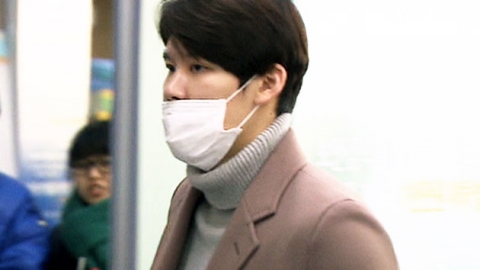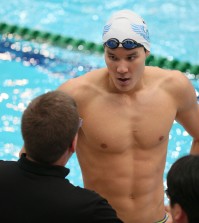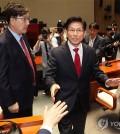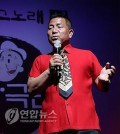- California Assembly OKs highest minimum wage in nation
- S. Korea unveils first graphic cigarette warnings
- US joins with South Korea, Japan in bid to deter North Korea
- LPGA golfer Chun In-gee finally back in action
- S. Korea won’t be top seed in final World Cup qualification round
- US men’s soccer misses 2nd straight Olympics
- US back on track in qualifying with 4-0 win over Guatemala
- High-intensity workout injuries spawn cottage industry
- CDC expands range of Zika mosquitoes into parts of Northeast
- Who knew? ‘The Walking Dead’ is helping families connect
Park Tae-hwan hires Swiss-based attorney for doping hearing
SEOUL (Yonhap) — Beleaguered South Korean swimmer Park Tae-hwan, reeling from a positive doping test, has hired a foreign attorney in preparation for an international doping hearing, officials here said Thursday.
FINA, the sport’s international governing body, told South Korean officials Wednesday that the hearing on Park’s case will be held Feb. 27 in Lausanne, Switzerland, and has asked Park to attend.
A Korea Swimming Federation (KSF) official said Park has enlisted the help of a Switzerland-based lawyer for the occasion.
Park, a four-time Olympic medalist and two-time world champ, has blamed an injection given by a doctor at a Seoul hospital for the result. State prosecutors investigating charges of the doctor’s professional negligence later said the injection contained testosterone, a substance banned by the World Anti-Doping Agency (WADA).
“Park has already hired a Korean lawyer in the ongoing case (over the hospital’s legal responsibility),” the KSF official said.
“In addition, he has brought on board a legal representative based in Switzerland with expertise in doping cases.”
According to the KSF, FINA informed it and Park of the test result at the end of last October.
FINA collected Park’s urine samples in early September, as Park was training for the Asian Games in the South Korean city of Incheon that opened later the same month. All swimming competitions were held in an arena named after Park.
FINA took A and B samples from Park. According to the KSF, the A sample tested positive, and Park was subsequently informed in October.
He asked for the analysis of the B sample, and it was tested for three days starting Dec. 2 at a WADA-accredited lab in Montreal. With a representative each from the KSF and Park’s agency on hand, the B sample also came out positive. The KSF formally received the news in mid-December.
The organizing committee for the Asian Games confirmed earlier this week that Park passed three doping tests during the competition in late September.
According to prosecutors, officials from the hospital have claimed that they gave Park the injection to help boost his hormone levels but that they weren’t aware that testosterone was a banned substance.
Park’s camp has told the authorities that the swimmer repeatedly asked the hospital about the contents of the injection and that he was assured that the shot would be clean.
Regardless of any legal responsibility to be shouldered by the hospital, Park, one of South Korea’s most visible athletes, will likely be held accountable for the result and face discipline, based on WADA’s World Anti-Doping Code.
In Article 10, titled “Sanctions on Individuals,” the code states that if an athlete can establish that he or she bears no fault or is negligent, the athlete may not face sanctions. However, one exception cited by the same code is “the administration of a prohibited substance by the athlete’s personal physician or trainer without disclosure to the athlete.”
The code also points out, “Athletes are responsible for their choice of medical personnel and for advising medical personnel that they cannot be given any prohibited substance.”














